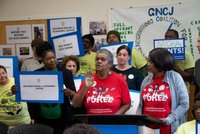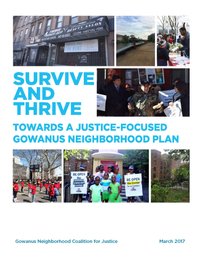Pratt Center provided technical assistance to the Gowanus Neighborhood Coalition for Justice (GNCJ), a group of stakeholders convened by Fifth Avenue Committee to elevate the priorities of low- and moderate- income residents, industrial firms, and neighborhood-based organizations and small businesses during the Gowanus neighborhood rezoning.

BACKGROUND
In October 2016, the City made its long-awaited announcement to include Gowanus, Brooklyn on its list of “Housing New York” neighborhood rezonings. Even prior to the announcement, there had been extensive planning and community discussion about the future of the area, and Pratt Center has a long history of partnering with community-based groups concerned with accountable development and environmental justice in the area. From 2013-2015 Pratt Center guided Bridging Gowanus, a community planning process to shape a sustainable, livable, and inclusive future for the Gowanus neighborhood.
Today, the majority of the Gowanus is zoned for manufacturing and surrounds a working canal, with the neighborhood boasting a strong industrial sector. At the same time, Gowanus has been drastically transformed in the last 15 years. Residents have been priced out and pushed out, as evidenced by the loss of rent stabilized housing and the decline of the Latino community. Meanwhile, industrial businesses are competing with as-of-right uses while small businesses are unable to afford their rent.

OUTCOMES
In March 2017, Pratt Center assisted GNCJ with the release of Survive and Thrive: Towards a Justice-Focused Gowanus Neighborhood Plan, a report that expands on the Coalition's platform and highlights the most pressing community issues: racial justice, repairs for public housing, environmental injustices related to the Gowanus Canal, and protecting locally-owned small and industrial businesses. We also created and facilitated custom trainings to break down the city’s complex environmental review process so that stakeholders could more effectively make their voices heard in it.
In 2020, Pratt Center used the Gowanus experience as a case study of how the City undermines its ability to recover the increased land and real estate values that result from up-zonings. Our report, Our Hidden Treasure: Recovering Land Value to Repair and Rebuild, recommends mechanisms for capturing some of that additional value and redirecting it toward historically marginalized communities that face race- and class-based inequities.
In 2021, after years of organizing and advocacy, the coalition’s bottom lines—$200 million for the rehabilitation of nearby public housing, preventing additional pollution into the Gowanus Canal, and community oversight to ensure accountability—were met, and the Gowanus rezoning deal was approved. One of the last major land use initiatives of the DeBlasio administration, the rezoning will pave the way for bringing a substantial new residential population to what was formerly a largely industrial area through the creation of 8,500 new housing units (of which 3,000 will be below market-rate).
